Say It Loud: "I Am Not A Racist!"
Authored by Stuart Reges, University of Washington via CampusReform.org,
When young people today watch images of police turning a firehose on black demonstrators they can only imagine what America was like in those days, but I don’t have to imagine it. I lived in that America and watching its sins displayed night after night on the evening news deeply affected me. That is why I have done a great deal of soul searching ever since I have been accused of being a racist.
It started when the UW College Republicans organized an affirmative action bake sale where they sold cookies at different prices depending upon the customer’s race. It was a political stunt meant to make people angry and they succeeded. Hundreds of protestors gathered around their booth along with a dozen police officers. I stopped by and tried to have a conversation with a young protestor but it degenerated into a situation where she loudly denounced me to a mob of several dozen students that surrounded me.
At one point I said that I didn’t see rampant racism on campus and the crowd burst into laughter. A local paper called The Stranger wrote about the incident and a local TV station included it on the evening news. I was surprised to find that this single incident branded me as a racist to many students and colleagues. After one of our students complained, the director of my school reprimanded me for a “lack of sensitivity to minority students.” A student experience survey conducted at the time generated several angry comments about me including one that said that I am “a garbage person and should not be teaching in this institution” and that I am, “the symbol of hate, ignorance, racism, and white supremacy. I would not be surprised if they were in the KKK.”
Last summer when I posted a message to a faculty mailing I was accused of being a racist for defending police officers during our summer of riots.
One faculty member wrote that, “What Stuart has shared is racist, trolling behavior from a faculty member with a long history of documented racial biases.”
In my lifetime I have seen this country make incredible progress on the race issue, so I was confused to find myself accused of being a racist.
Shelby Steele provided an answer.
In his book Shame he writes that in our divided society liberals pursue “poetic truth” that “disregards the actual truth in order to assert a larger essential truth that supports one’s ideological position” and that poetic truths “work by moral intimidation rather than by reason, so that even to question them is heresy.”
He goes on to write that:
“if you want to be politically correct, if you want to be seen as someone who is cleansed of America’s past ugliness, you will go along with the poetic truth that racism is still a great barrier for blacks. Conversely, embracing the literal truth—that racism is no longer a serious barrier—will make you politically incorrect and will stigmatize you with that ugliness.”
I know in my heart that I do not harbor ill will towards anyone based on race and it seems clear that most Americans believe the same thing. Overt racism has all but disappeared from modern life, especially on college campuses, but progressives have concocted various explanations for hidden forms of racism.
One accusation is that we have bias that we aren’t even aware of. In reviewing the many decisions I have made in my 35-year university career for admissions, hiring, and grading, I can’t find even one incident of negative racial bias. The only examples of bias were in the opposite direction with minority candidates treated more favorably. The euphemism is that they are “diversity” candidates as in, “We can hire three faculty this year, but the dean said that we can hire up to two more if they are diversity hires.”
Another accusation has been the claim of systemic racism, the idea that white men built our society so that it favors them. This idea should not be dismissed out of hand. I still remember when I first visited a store for left-handed people. I was amazed to find how much our society has been designed to work well for right-handed people. I didn’t realize that can openers and desks and notebooks had all been designed for right-handed people like me.
To take this idea seriously, though, the proponents would have to produce examples of how the system has been tilted in favor of white people. Where is the equivalent of the left-handed can opener? Many people have taken a stab at this although there are few convincing examples and many cases where people who make this argument have had to retract their claims. For example, The Smithsonian quickly apologized for producing a poster that indicated that white culture includes rugged individualism, the nuclear family, and the scientific method.
The only solid evidence for systemic racism is the fact that there are differences in outcomes across races with whites and Asians generally performing better. But this argument falls apart when you consider alternate explanations. In my own courses I have found that course grades are highly correlated with lecture attendance and that mathematical background seems to be an issue for many students who struggle.
So to the extent that some minority students perform less well in my courses, it seems most likely that this stems from factors other than race including a weak math background and students putting in less effort than others.
Shame is a powerful emotion, but it’s time to stand up to these ideological bullies and to speak the truth.
It is not racist to oppose affirmative action.
It is not racist to challenge the claim of rampant racism on college campuses.
It is not racist to support the police.
It is not racist to challenge the claim of hidden bias and systemic racism.
I am not a racist and I won’t stay silent any longer.
https://ift.tt/3nqetFT
from ZeroHedge News https://ift.tt/3nqetFT
via IFTTT






0 comments
Post a Comment